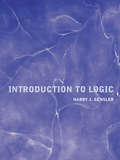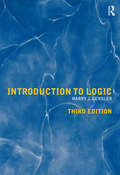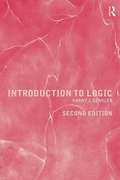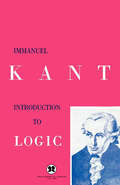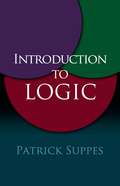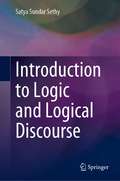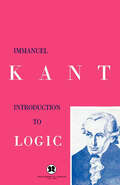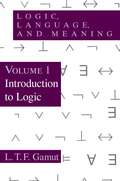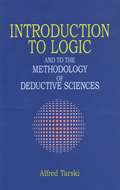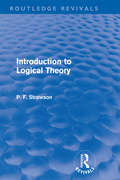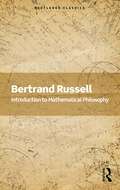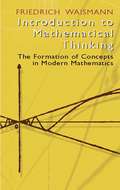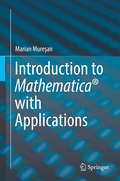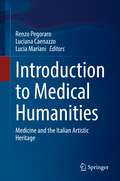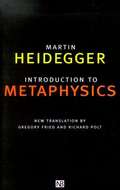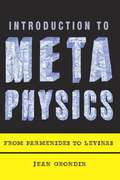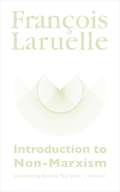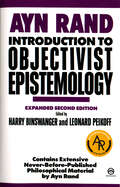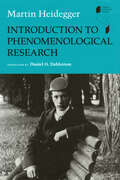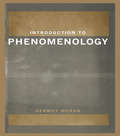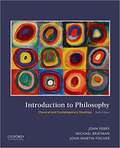- Table View
- List View
Introduction to Logic
by Harry GenslerIntroduction to Logic offers one of the most clear, interesting and accessible introductions to what has long been considered one of the most challenging subjects in philosophy. Harry Gensler engages students with the basics of logic through practical examples and important arguments both in the history of philosophy and from contemporary philosophy. Using simple and manageable methods for testing arguments, students are led step-by-step to master the complexities of logic.The companion LogiCola instructional program and various teaching aids (including a teacher's manual) are available from the book's website: www.routledge.com/textbooks/gensler_logic
Introduction to Logic
by Harry J GenslerIntroduction to Logic is clear and concise, uses interesting examples (many philosophical in nature), and has easy-to-use proof methods. Its key features, retained in this Third Edition, include: simpler ways to test arguments, including an innovative proof method and the star test for syllogisms; a wide scope of materials, suiting it for introductory or intermediate courses; engaging examples, from philosophy and everyday life; useful for self-study and preparation for standardized tests, like the LSAT; a reasonable price (a third the cost of some competitors); and exercises that correspond to the free LogiCola instructional program. ? This Third Edition: improves explanations, especially on areas that students find difficult; has a fuller explanation of traditional Copi proofs and of truth trees; and updates the companion LogiCola software, which now is touch friendly (for use on Windows tablets and touch monitors), installs more easily on Windows and Macintosh, and adds exercises on Copi proofs and on truth trees. You can still install LogiCola for free (from http://www.harryhiker.com/lc or http://www.routledge.com/cw/gensler).
Introduction to Logic
by Harry J. GenslerIntroduction to Logic combines likely the broadest scope of any logic textbook available with clear, concise writing and interesting examples and arguments. Its key features, all retained in the Second Edition, include: * simpler ways to test arguments than those available in competing textbooks, including the star test for syllogisms* a wide scope of materials, making it suitable for introductory logic courses (as the primary text) or intermediate classes (as the primary or supplementary book)* engaging and easy-to-understand examples and arguments, drawn from everyday life as well as from the great philosophers* a suitability for self-study and for preparation for standardized tests, like the LSAT* a reasonable price (a third of the cost of many competitors)* exercises that correspond to the LogiCola program, which may be downloaded for free from the web. This Second Edition also: * arranges chapters in a more useful way for students, starting with the easiest material and then gradually increasing in difficulty* provides an even broader scope with new chapters on the history of logic, deviant logic, and the philosophy of logic* expands the section on informal fallacies* includes a more exhaustive index and a new appendix on suggested further readings* updates the LogiCola instructional program, which is now more visually attractive as well as easier to download, install, update, and use.
Introduction to Logic
by Immanuel Kant T K AbbottWritten during the height of the Enlightenment, Immanuel Kant's Introduction to Logic is an essential primer for anyone interested in the study of Kantian views on logic, aesthetics, and moral reasoning. More accessible than his other books, Introduction to Logic lays the foundation for his writings with a clear discussion of each of his philosophical pursuits. For more advanced Kantian scholars, this book can bring to light some of the enduring issues in Kant's repertoire; for the beginner, it can open up the philosophical ideas of one of the most influential thinkers on modern philosophy. This edition comprises two parts: "Introduction to Logic" and an essay titled "The False Subtlety of the Four Syllogistic Figures," in which Kant analyzes Aristotelian logic.
Introduction to Logic
by Patrick SuppesPart I of this coherent, well-organized text deals with formal principles of inference and definition. Part II explores elementary intuitive set theory, with separate chapters on sets, relations, and functions. Ideal for undergraduates.
Introduction to Logic and Critical Thinking
by Merrilee SalmonDesigned for students with no prior training in logic, INTRODUCTION TO LOGIC AND CRITICAL THINKING offers an accessible treatment of logic that enhances understanding of reasoning in everyday life. The text begins with an introduction to arguments. After some linguistic preliminaries, the text presents a detailed analysis of inductive reasoning and associated fallacies. This order of presentation helps to motivate the use of formal methods in the subsequent sections on deductive logic and fallacies. Lively and straightforward prose assists students in gaining facility with the sometimes challenging concepts of logic. By combining a sensitive treatment of ordinary language arguments with a simple but rigorous exposition of basic principles of logic, the text develops students' understanding of the relationships between logic and language, and strengthens their skills in critical thinking.
Introduction to Logic and Logical Discourse
by Satya Sundar SethyThis book focuses on logic and logical language. It examines different types of words, terms and propositions in detail. While discussing the nature of propositions, it illustrates the procedures used to determine the truth and falsity of a proposition, and the validity and invalidity of an argument. In addition, the book provides a clear exposition of the pure and mixed form of syllogism with suitable examples. The book encompasses sentential logic, predicate logic, symbolic logic, induction and set theory topics. The book is designed to serve all those involved in teaching and learning courses on logic. It offers a valuable resource for students and researchers in philosophy, mathematics and computer science disciplines. Given its scope, it is an essential read for everyone interested in logic, language, formulation of the hypotheses for the scientific enquiries and research studies, and judging valid and invalid arguments in the natural language discourse.
Introduction to Logic: And His Essay On The Mistaken Subtilty Of The Four Figures
by Immanuel KantThis essential text by one of the founders of modern philosophy offers an accessible introduction to his views on logic, aesthetics, and morality. Written during the height of the Enlightenment, Immanuel Kant&’s Introduction to Logic is a clear and concise primer for his larger works Critique of Pure Reason and Groundwork for the Metaphysics of Morals. More accessible than his other books, it provides definitions of Kantian terms and a clear discussion of each of his philosophical pursuits. For more advanced Kantian scholars, this book can bring to light some of the enduring issues in Kant&’s repertoire; for the beginner, it can open up the philosophical ideas of one of the most influential thinkers on modern philosophy. This edition comprises two parts: &“Kant&’s Introduction to Logic&” and an essay titled &“The Mistaken Subtilty of the Four Syllogistic Figures,&” in which Kant analyzes Aristotelian logic.
Introduction to Logic: Evaluating Arguments
by Ed TeallWhat makes an argument a good argument? This is probably not a question you have ever thought or cared much about. It is important, though, because people use arguments to try to convince us to do their bidding or to accept their claims as true. We also need to make arguments to convince others to do our bidding or to accept what we are saying is true. For these reasons, we want to be able to identify the arguments of others that are not convincing, and we want to make our arguments as convincing as possible. This book is a guide for identifying convincing arguments and for determining whether an argument is a good one, and one you should accept. Determining which arguments to accept requires us to evaluate arguments.
Introduction to Logic: Introduction to Logic (Logic, Language, and Meaning)
by L.T.F. GamutAlthough the two volumes of Logic, Language, and Meaning can be used independently of one another, together they provide a comprehensive overview of modern logic as it is used as a tool in the analysis of natural language. Both volumes provide exercises and their solutions. Volume 1, Introduction to Logic, begins with a historical overview and then offers a thorough introduction to standard propositional and first-order predicate logic. It provides both a syntactic and a semantic approach to inference and validity, and discusses their relationship. Although language and meaning receive special attention, this introduction is also accessible to those with a more general interest in logic. In addition, the volume contains a survey of such topics as definite descriptions, restricted quantification, second-order logic, and many-valued logic. The pragmatic approach to non-truthconditional and conventional implicatures are also discussed. Finally, the relation between logic and formal syntax is treated, and the notions of rewrite rule, automation, grammatical complexity, and language hierarchy are explained.
Introduction to Logic: and to the Methodology of Deductive Sciences (Oxford Logic Guides #24)
by Alfred TarskiFirst published in Polish in 1936, this classic work was originally written as a popular scientific book — one that would present to the educated lay reader a clear picture of certain powerful trends of thought in modern logic. According to the author, these trends sought to create a unified conceptual apparatus as a common basis for the whole of human knowledge.Because these new developments in logical thought tended to perfect and sharpen the deductive method, an indispensable tool in many fields for deriving conclusions from accepted assumptions, the author decided to widen the scope of the work. In subsequent editions he revised the book to make it also a text on which to base an elementary college course in logic and the methodology of deductive sciences. It is this revised edition that is reprinted here.Part One deals with elements of logic and the deductive method, including the use of variables, sentential calculus, theory of identity, theory of classes, theory of relations and the deductive method. The Second Part covers applications of logic and methodology in constructing mathematical theories, including laws of order for numbers, laws of addition and subtraction, methodological considerations on the constructed theory, foundations of arithmetic of real numbers, and more. The author has provided numerous exercises to help students assimilate the material, which not only provides a stimulating and thought-provoking introduction to the fundamentals of logical thought, but is the perfect adjunct to courses in logic and the foundation of mathematics.
Introduction to Logical Theory (Routledge Revivals)
by P. F. StrawsonFirst published in 1952, professor Strawson’s highly influential Introduction to Logical Theory provides a detailed examination of the relationship between the behaviour of words in common language and the behaviour of symbols in a logical system. He seeks to explain both the exact nature of the discipline known as Formal Logic, and also to reveal something of the intricate logical structure of ordinary unformalised discourse.
Introduction to Mathematical Philosophy (Routledge Classics)
by Bertrand Russell"The philosophy of mathematics will naturally be expected to deal with questions at the frontier of knowledge, as to which comparative certainty is not yet attained. But separation of such questions is hardly likely to be fruitful unless the more scientific parts of mathematics are known. A book dealing with those parts may, therefore, claim to be an introduction to mathematical philosophy..." - Bertrand Russell, from the Preface First published in 1919, Introduction to Mathematical Philosophy shows Russell drawing on his formidable knowledge of philosophy and mathematics to write a brilliant introduction to the subject. Russell explains that mathematics can be approached in two distinct directions: one that is driven by a mechanical kind of simplicity and builds towards complexity, from integers to fractions and real numbers to complex ones; and one that searches for abstractness and logical simplicity by asking what general principles underlie mathematics. From here Russell introduces and explains, in his customary pellucid prose, the definition of numbers, finitude, correlation and relation, mathematical limits, infinity, propositional descriptions and classes. Russell concludes with a fascinating summary of the relationship between mathematics and logic, of which he states "logic is the youth of mathematics." This Routledge Classics edition includes a new Foreword by Michael Potter.
Introduction to Mathematical Thinking: The Formation of Concepts in Modern Mathematics (Dover Books on Mathematics)
by Friedrich WaismannThis enlightening survey of mathematical concept formation holds a natural appeal to philosophically minded readers, and no formal training in mathematics is necessary to appreciate its clear exposition of mathematic fundamentals. Rather than a system of theorems with completely developed proofs or examples of applications, readers will encounter a coherent presentation of mathematical ideas that begins with the natural numbers and basic laws of arithmetic and progresses to the problems of the real-number continuum and concepts of the calculus.Contents include examinations of the various types of numbers and a criticism of the extension of numbers; arithmetic, geometry, and the rigorous construction of the theory of integers; the rational numbers, the foundation of the arithmetic of natural numbers, and the rigorous construction of elementary arithmetic. Advanced topics encompass the principle of complete induction; the limit and point of accumulation; operating with sequences and differential quotient; remarkable curves; real numbers and ultrareal numbers; and complex and hypercomplex numbers.In issues of mathematical philosophy, the author explores basic theoretical differences that have been a source of debate among the most prominent scholars and on which contemporary mathematicians remain divided. "With exceptional clarity, but with no evasion of essential ideas, the author outlines the fundamental structure of mathematics." — Carl B. Boyer, Brooklyn College. 27 figures. Index.
Introduction to Mathematica® with Applications
by Marian MureşanStarting with an introduction to the numerous features of Mathematica®, this book continues with more complex material. It provides the reader with lots of examples and illustrations of how the benefits of Mathematica® can be used. Composed of eleven chapters, it includes the following: A chapter on several sorting algorithmsFunctions (planar and solid) with many interesting examplesOrdinary differential equationsAdvantages of Mathematica® dealing with the Pi numberThe power of Mathematica® working with optimal control problems Introduction to Mathematica® with Applications will appeal to researchers, professors and students requiring a computational tool.
Introduction to Medical Humanities: Medicine and the Italian Artistic Heritage
by Renzo Pegoraro Luciana Caenazzo Lucia MarianiThis book proposes an integrated and interdisciplinary approach recording and interpreting the human experience of illness, disability, care, and medical intervention. In our age of deeply technologically-driven medicine, it is crucial to re-establish and promote the neglected relationship between medicine and the arts. This textbook contains contributions by scholars in various fields, who offer their qualified insights in order to reflect on illness, medicine, and the role of physicians and nurses. All chapters overcome a reductive conception of a medicine that is only able to biologically explain illness.All three editors of this book are researchers in Padua, a city that has been described as the cradle of modern medicine. From Gabriele Falloppio to Girolamo Fabrici d’Acquapendente and Giovanni Battista Morgagni, human, normal and pathological, anatomy has taken big steps forward. Galileo Galilei taught for eighteen years at the University of Padua and developed the scientific method there. During the same period, Padua was also the “nursery of arts”, as Shakespeare wrote. In fact, Padua developed, especially in the XIV, XV, and XVI centuries, an impressive and unique artistic culture thanks to artists such as Giotto, Donatello and Titian. Finally, the city of Saint Anthony is a place where a religious feeling strongly oriented towards charity is deeply rooted and strictly linking its history to that of its hospital. For all these reasons a combination of medical humanities and Italian artistic heritage is of interest to anyone involved in bioethics and medicine. This textbook is a unique resource for students of medicine, nursing, bioethics, psychology, theology, and history of art.
Introduction to Metaphysics
by Martin Heidegger Gregory Fried Richard PoltHeidegger's Introduction to Metaphysics, one of the most significant philosophical works of the 20th century, combines a powerful reinterpretation of Greek thought with a sweeping vision of Western history, and offers some clue as to the reasons for Heidegger's support of the Nazi regime. This new translation provides conventional translations of Greek passages that Heidegger translated unconventionally. There are also extensive notes, a German-English glossary, and an introduction that discusses the history of the text, its basic themes, and its place in Heidegger's oeuvre. Fried teaches philosophy and humanities at Boston University. Polt teaches philosophy at Xavier University. Annotation c. Book News, Inc., Portland, OR (booknews.com)
Introduction to Metaphysics
by Martin Heidegger Gregory FriedThis new edition of one of Heidegger's most important works features a revised and expanded translators' introduction and an updated translation, as well as the first English versions of Heidegger's draft of a portion of the text and of his later critique of his own lectures. Other new features include an afterword by Petra Jaeger, editor of the German text. "This revised edition of the translation of Heidegger's 1935 lectures, with its inclusion of helpful new materials, superbly augments the excellent translation provided in the first edition. The result is a richly rewarding volume, to be recommended to every student of Heidegger's works, whether a novice or a long-time reader."--Daniel Dahlstrom, Boston University
Introduction to Metaphysics: From Parmenides to Levinas
by Jean GrondinJean Grondin completes the first history of metaphysics and respects both the analytical and the Continental schools while transcending the theoretical limitations of each. He reviews seminal texts by Parmenides, Plato, Aristotle, Plotinus, and Augustine. He follows the theological turn in the metaphysical thought of Avicenna, Anselm, Aquinas, and Duns Scotus, and he revisits Descartes and the cogito; Spinoza and Leibniz's rationalist approaches; Kant's reclaiming of the metaphysical tradition; and post-Kantian practice up to Hegel. He engages with twentieth century innovations that upended the discipline, particularly Heidegger's revival of the question of Being and the rediscovery of the metaphysics of existence by Sartre and the Existentialists, language by Gadamer and Derrida, and transcendence by Levinas. Metaphysics is often dismissed as a form or epoch of philosophy that must be overcome, yet by promoting a full understanding of its platform and processes, Grondin reveals its cogent approach to reality and foundational influence on modern philosophy and science. By restoring the value of metaphysics for contemporary audiences, Grondin showcases the rich currents and countercurrents of metaphysical thought and its future possibilities.
Introduction to Non-Marxism (Univocal)
by François LaruelleFollowing the collapse of the communist states it was assumed that Marxist philosophy had collapsed with it. In Introduction to Non-Marxism, François Laruelle aims to recover Marxism along with its failure by asking the question &“What is to be done with Marxism itself?&” To answer, Laruelle resists the temptation to make Marxism more palatable after the death of metaphysics by transforming Marxism into a mere social science or by simply embracing with evangelical fervor the idea of communism. Instead Laruelle proposes a heretical science of Marxism that will investigate Marxism in both its failure and power so as to fashion new theoretical tools. In the course of engaging with the material of Marxism, Laruelle takes on the philosophy of Marx along with important philosophers who have extended that philosophy including Althusser, Balibar, Negri as well as the attempt at a phenomenological Marxism found in the work of Michel Henry. Through this engagement Laruelle develops with great precision the history and function of his concept of determination-in-the-last-instance. In the midst of the assumed failure of Marxism and the defections and resentment that followed, Laruelle&’s non-Marxism responds with the bold declaration: &“Do not give up on theory!&”
Introduction to Objectivist Epistemology: Expanded Second Edition
by Ayn Rand Leonard Peikoff Harry BinswangerToday man's mind is under attack by all the leading schools of philosophy. We are told that we cannot trust our senses, that logic is arbitrary, that concepts have no basis in reality. Ayn Rand opposes that torrent of nihilism, and she provides the alternative in this eloquent presentation of the essential nature--and power--of man's conceptual faculty. She offers a startlingly original solution to the problem that brought about the collapse of modern philosophy: the problem of universals. This brilliantly argued, superbly written work, together with an essay by philosophy professor Leonard Peikoff, is vital reading for all those who seek to discover that human beings can and should live by the guidance of reason.
Introduction to Phenomenological Research (Studies in Continental Thought)
by Martin HeideggerIn this collection of early lectures, the author of Being and Time defines and begins to develop his unique approach to phenomenology.This volume contains the first lectures Martin Heidegger delivered at Marburg in the winter semester of 1923–1924. In them, he introduces the notion of phenomenology by tracing it back to Aristotle’s treatments of phainomenon and logos. This extensive commentary on Aristotle is an important addition to Heidegger’s ongoing interpretations which accompany his thinking during the period leading up to Being and Time.Additionally, these lectures develop critical differences between Heidegger’s phenomenology and that of Descartes and Husserl and elaborate questions of facticity, everydayness, and flight from existence that are central in his later work. Here, Heidegger dismantles the history of ontology and charts a new course for phenomenology by defining and distinguishing his own methods.
Introduction to Phenomenology
by Dermot MoranIntroduction to Phenomenology is an outstanding and comprehensive guide to phenomenology. Dermot Moran lucidly examines the contributions of phenomenology's nine seminal thinkers: Brentano, Husserl, Heidegger, Gadamer, Arendt, Levinas, Sartre, Merleau-Ponty and Derrida.Written in a clear and engaging style, Introduction to Phenomenology charts the course of the phenomenological movement from its origins in Husserl to its transformation by Derrida. It describes the thought of Heidegger and Sartre, phenomonology's most famous thinkers, and introduces and assesses the distinctive use of phenomonology by some of its lesser known exponents, such as Levinas, Arendt and Gadamer. Throughout the book, the enormous influence of phenomenology on the course of twentieth-century philosophy is thoroughly explored.This is an indispensible introduction for all unfamiliar with this much talked about but little understood school of thought. Technical terms are explained throughout and jargon is avoided. Introduction to Phenomenology will be of interest to all students seeking a reliable introduction to a key movement in European thought.
Introduction to Phenomenology
by Robert SokolowskiThis book presents the major philosophical doctrines of phenomenology in a clear, lively style with an abundance of examples. The book examines such phenomena as perception, pictures, imagination, memory, language, and reference, and shows how human thinking arises from experience. It also studies personal identity as established through time and discusses the nature of philosophy. In addition to providing a new interpretation of the correspondence theory of truth, the author also explains how phenomenology differs from both modern and postmodern forms of thinking.
Introduction to Philosophy
by John Perry Michael Bratman John Martin FischerIntroduction to Philosophy: Classical and Contemporary Readings is the most comprehensive topically organized collection of classical and contemporary philosophy available. Ideal for introductory philosophy courses, the text offers a broad range of readings and depth. The text includes sections on God and Evil, Knowledge and Reality, the Philosophy of Science, the Mind/Body problem, Freedom of Will, Consciousness, Ethics, Political Philosophy, Existential Issues, and philosophical Puzzles and Paradoxes. (The unique section on Puzzles and Paradoxes is often praised by both instructors and students.) <p><p> Easy to use for both students and instructors alike, the book incorporates boldfaced key terms (listed after each reading and defined in the glossary); a guide to writing philosophy papers; and a “Logical Toolkit;” and study questions after each reading selection. These features have allowed more students to learn philosophy by using what is seen as the highest quality collection of philosophical readings available. The ninth edition will be revised based on reviewer suggestions, and will include more diversity and readings by female philosophers.
